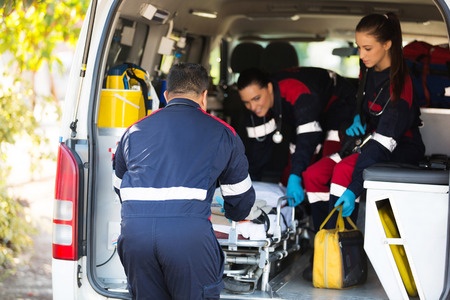Sleep Deprivation Is A Recipe For Disaster For Emergency Responders
August 3, 2015 | Category: Wrongful Death | Share The emergency medical services industry is trusted to save lives, but all of that can change when a worker dozes off behind the wheel. An ABC News “Good Morning America “ investigation discovered that EMS driver fatigue is an issue causing increasing concern in the EMS industry, with some calling for federal standards limiting shift lengths to address the problem of EMS worker fatigue.
The emergency medical services industry is trusted to save lives, but all of that can change when a worker dozes off behind the wheel. An ABC News “Good Morning America “ investigation discovered that EMS driver fatigue is an issue causing increasing concern in the EMS industry, with some calling for federal standards limiting shift lengths to address the problem of EMS worker fatigue.
Fatigue stems from inadequate rest and results in impaired physical and mental abilities. Factors that contribute to fatigue include the time of day a person works, the length of time engaged in work activities (shift length) and the quality and amount of sleep obtained during and surrounding work hours.
Why are EMS workers so prone to fatigue?
An EMS continuing education article says:
- In most emergency medical services, 24-hour shifts are normal, with forty-eight hours off between shifts to recover.
- There is a national shortage of paramedics, which creates a greater need for empty shifts to be covered by currently overworked paramedics.
- Most EMS workers work multiple jobs, and the structure of shifts across occupations may not be comparable.
- EMS workers are constantly faced with difficult clinical cases and workloads that are taxing physically, mentally, and emotionally.
- Paramedics often work through normal meal times and are usually awakened two or three times a night for at least an hour or more each time.
What are the dangers of sleep deprivation?
The JEMS (Journal of Emergency Medical Services - March 2012) reported on a study by researchers at the University of Pittsburg, published in Pre-Hospital Emergency Care. The study links sleep deprivation of EMS responders to increased rates of injuries and medical errors. Researchers evaluated the sleep quality of EMS responders from a variety of agencies across the U.S. to assess physical and mental fatigue. Over the same period of time, they examined safety outcome data to determine provider injury, medical errors, adverse events and safety-compromising behaviors. The researchers classified more than half of the respondents as fatigued. After controlling for variables, the results showed that fatigued respondents were 1.9 times more likely than non-fatigued respondents to be injured on the job; 2.2 times more likely to commit a medical error or adverse event; and 3.6 times more likely to be involved in a safety-compromising behavior. The most common errors were protocol deviation, dropping patients and medication errors.
Sleep deprivation produces impairments in the central nervous system (CNS) that can result in drowsiness, fatigue, decreased alertness, slowed reaction time, and impaired thinking and judgment; these effects can lead to accidents, errors, injuries, and fatalities. In fact, studies have shown that being awake for 18 hours produces impairment equal to a blood alcohol concentration (BAC) of 0.05 percent and reaches a BAC equivalent of 0.10 percent after 24 hours of wakefulness. Therefore, a drowsy driver may be just as dangerous as a drunk driver says FireEngineering.com.
Jim Love, former National Director of Safety and Risk for AMR (American Medical Response) reported in How to combat sleep deprivation in EMS:
Speak up - First we need to foster open communications. We should have an environment and culture where an employee can call a supervisor and say, "Man I just can't stay awake."
Partners should watch out for each other and should speak up, and acknowledge long shifts and off-duty activities that may impact sleep.
Departments can post a safety message about the hazards of sleep deprivation, and invite employees to speak up.
"If you or a loved one has been injured as the result of being in an accident with a drowsy driver, contact an experienced attorney at Spivey Law Firm, Personal Injury Attorneys, P.A. There are liabilities associated with these types of accidents including the liability of the emergency response company if it had knowledge of an employee's fatigue status," says Attorney Randall Spivey.
Fort Myers Accident Attorney, Randall L. Spivey is a Board Certified Trial Attorney – the highest recognition for competence bestowed by the Florida Bar and a distinction earned by just one (1%) percent of Florida attorneys. He has handled over 2,000 personal injury and wrongful death cases throughout Florida. For a free and confidential consultation to discuss your legal rights, contact the Spivey Law Firm, Personal Injury Attorneys, P.A., in Lee County at 239.337.7483 or toll free at 1.888.477.4839,or by email to Randall@SpiveyLaw.com. Visit SpiveyLaw.com for more information. You can contact Spivey Law Firm, Personal Injury Attorneys, P.A.in Charlotte County at 941.764.7748 and in Collier County 239.793.7748.

